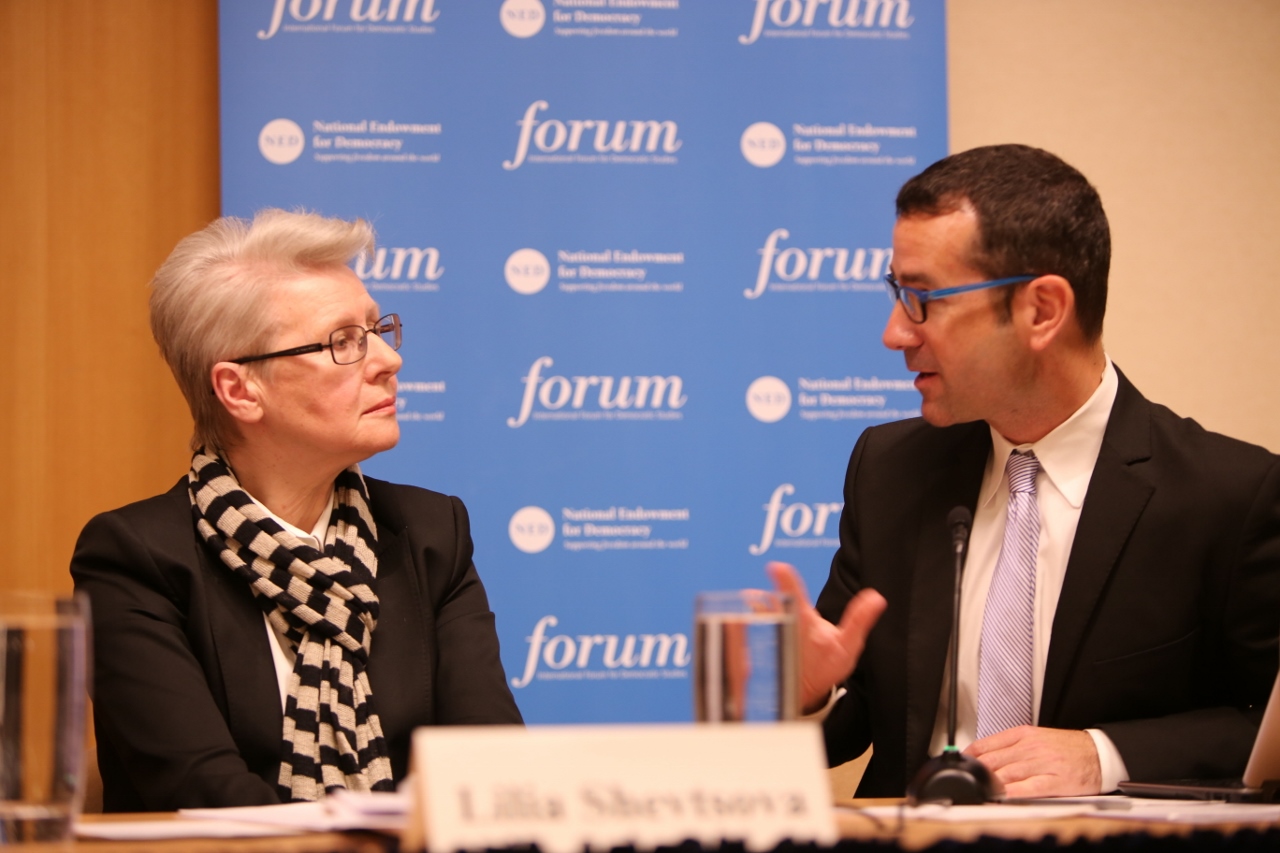
A new Russian landscape is emerging that demands patient observation, even if is still unclear what comes next amidst the COVID-19 pandemic, notes Lilia Shevtsova (above, left), the Richard von Weizsäcker Fellow at the Robert Bosch Academy and a member of the Editorial Board of the National Endowment for Democracy’s Journal of Democracy. There are two scenarios in play that depend on how the crisis evolves and how authorities respond, she writes for the American Interest:
- The New Norm scenario would obtain if the virus is contained before the end of the year. But even in this case, Russia will not avoid economic damage… The poll numbers could look non-threatening to the Kremlin. The authorities’ ratings have started to decline, but not dramatically. Putin’s approval rating of 63 percent might reassure him. But only 28.3 percent of Russians surveyed by VTsIOM in March picked Putin when asked to name a politician whom they trust, the lowest percentage since the pollster began asking the question in January 2006. The fact that 38 percent of respondents say that Putin represents the interests of oligarchs, 37 percent say that he represents the interests of the power structures, and 28 percent say that he represents the bureaucrats is a warning that the mass support for his leadership isn’t guaranteed.
- In the second, more dramatic Fight for Survival scenario, Russia fails both to stop the pandemic in 2020 and to find a balance between combatting the virus and saving the economy. …In addition to street turmoil, there would probably be a split among the political elite. One can’t exclude the rise of dissent not only within the loyalists in Moscow but also among regional elites frustrated at being left to their own devices during the pandemic.
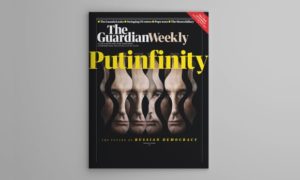
The Guardian
At the moment this latter scenario seems unlikely, she observes. However… the mixture of an insecure political elite, especially in the vulnerable regions, and the rage of ordinary people could become powerfully explosive. This may create an opening for the emergence of a new political center.
What happened to Russia at the collapse of the USSR in 1991? Reforms sparked by the final Soviet leader, Mikhail Gorbachev, seemed to be ushering in the birth of democracy. An attempted coup by the Soviet old guard was soundly repulsed. Yet a quarter of a century later, autocracy is firmly in command again, notes JSTOR’s Matthew Wills.
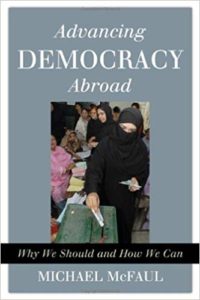 But autocracy wasn’t necessarily Russia’s destiny, writes political scientist Michael McFaul: author of Advancing Democracy Abroad (right). “Russia’s present system of government did not result inevitably from historical structures—that is, from cultural, geographic, or socio-economic inheritances from its Soviet or tsarist past,” he writes in Choosing Autocracy: Actors, Institutions, and Revolution in the Erosion of Russian Democracy, citing three reasons for the rise of Russian autocracy:
But autocracy wasn’t necessarily Russia’s destiny, writes political scientist Michael McFaul: author of Advancing Democracy Abroad (right). “Russia’s present system of government did not result inevitably from historical structures—that is, from cultural, geographic, or socio-economic inheritances from its Soviet or tsarist past,” he writes in Choosing Autocracy: Actors, Institutions, and Revolution in the Erosion of Russian Democracy, citing three reasons for the rise of Russian autocracy:
- First, revolutionary change simply “made democratic emergence less likely” in the chaos of “empire collapse, political change, and economic transformation,” as the USSR broke up into fifteen newly independent states. The economic collapse of the Russian portion of the old USSR has been described by the World Bank as much worse than the Great Depression in the United States. As McFaul relates, “Crime rates spiked; life expectancies, especially for men, dropped dramatically; and illegal drug use soared, fueling a growing AIDS crisis.”
- Second, Russian elites “made decisions that first promoted democracy, but then undermined democracy and encouraged autocracy.” An example of this was the “super-presidential” powers embodied in the 1993 constitution, which set the stage for any autocrat wiling to to use them.
-
Third, “legacies from the Soviet era provided institutional material for autocratic restoration.” Vladimir Putin himself was a KGB apparatchik, able to draw on a corrupt and totalitarian police force. The KGB had been discredited by its role in the 1991 coup, but it bounced back with a vengeance, shedding only its Soviet name.
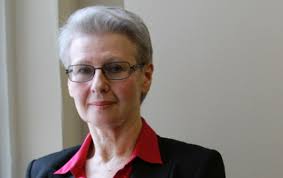 The pandemic will force Russians to deliberate on questions like the value of life now versus that of the next generation, justice and equality, sacrifice and empathy, adds Shevtsova, (left), a former Reagan-Fascell fellow at the National Endowment for Democracy (NED). Such an existential narrative is always a helpful frame for a nation that has to assess its destiny. But one has to think about other challenges regarding Russia’s future as well:
The pandemic will force Russians to deliberate on questions like the value of life now versus that of the next generation, justice and equality, sacrifice and empathy, adds Shevtsova, (left), a former Reagan-Fascell fellow at the National Endowment for Democracy (NED). Such an existential narrative is always a helpful frame for a nation that has to assess its destiny. But one has to think about other challenges regarding Russia’s future as well:
- First, is it possible that a state based on expansionism and hegemony could be transformed before the turmoil, or is a change of order only possible after the system’s disintegration?
- Second, is it possible to transform Russia within its current borders? How would one go about transforming all of Russia, including, say, Chechnya, which long ago became a civilizational project unto itself? If it can’t be done, how could Russia peacefully rid itself of its imperial ballast?
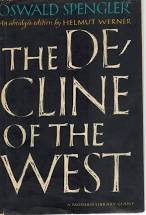 Third, if the Russian system is doomed, what does that mean for Russia as a nation? In The Decline of the West, Oswald Spengler offered the following description of Russian civilization: “The primitive tsarism of Moscow is the only form that is even today appropriate to the Russian world.” According to Russian tradition, the Leader embodies the homeland, which is the foundation of Russian tsarism. But will it survive once the pandemic crisis is over and the people understand that tsarism can’t cope with the changes Russia is facing? Will the society be ready to sacrifice for the sake of a new order?
Third, if the Russian system is doomed, what does that mean for Russia as a nation? In The Decline of the West, Oswald Spengler offered the following description of Russian civilization: “The primitive tsarism of Moscow is the only form that is even today appropriate to the Russian world.” According to Russian tradition, the Leader embodies the homeland, which is the foundation of Russian tsarism. But will it survive once the pandemic crisis is over and the people understand that tsarism can’t cope with the changes Russia is facing? Will the society be ready to sacrifice for the sake of a new order?- Fourth, what about the role of the West? The Western democracies are understandably alarmed by the prospect of upheaval in nuclear-armed Russia. They are trying to avoid taking steps that might destabilize the regime, and there are powerful forces in the West that cater to its interests. Does this mean that the West will help the Russian system to reproduce itself?







